A few weeks ago, Aaron emailed me an invite. I took it up but only after he followed up by speaking to me face to face (I've a point to make about this, at the end of the post).
WHAT THE VARK?
Aardvark works like this: You send a question and it finds someone who can answer. Or it will send you questions that you've told Aardvark you'd like to try answering.
The service isn't an Expert System. It doesn't answer your question but would try to find another member in its network who might be able to.
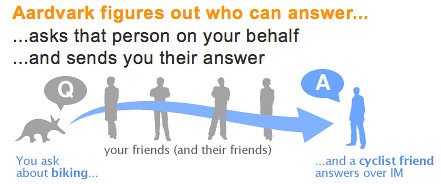
Signing up was a breeze. The set-up was systematic and intuitive.
A 20-second demo was enough to get one started (to the librarians out there, this is not to say 20 seconds was enough to educate potential librarians on the art of questioning and the Reference Interview... I wish it were that easy too!)

Basically, I specify the type of questions/ topics I'm most comfortable answering.

Then I tell Aardvark whether I'd like to talk to Aardvark via email or chat, or both (by "talk", it means how I wish Aardvark to send questions for me to answer, and how I'd like to send my own questions to Aardvark).

At the Aardvark dashboard, I can access the questions I've asked and also those I've answered. So far, my questions have not been answered. I've a choice whether to resubmit
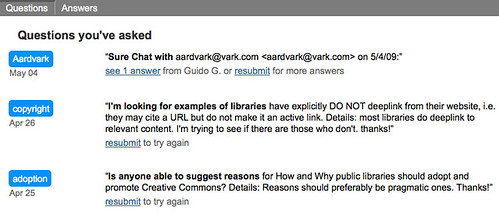
It's unclear to me how continuous and proactive is Aardvark in attempting to match my questions with people who might be able to answer. Or how questions are queued and given priority.
Seems that there's a certain time frame that Aardvark will attempt the match, after which my question would be put on my History page. I have the option of resubmitting. In that sense, I guess my question is considered "closed". Aardvark might want to provide a "Remove my question" option there.
AARDVARK IN ACTION
When I log in to my Gmail account, I can see Aardvark as one of my contact.
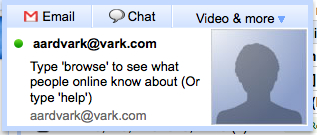
To interact with Aardvark, I send a text command, like IRC (do people still do IRC now?)
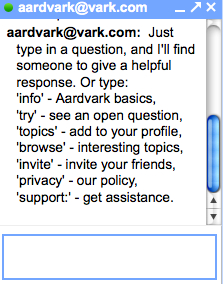
This is one example of how questions are sent my way (in this case, I'd "pass"):
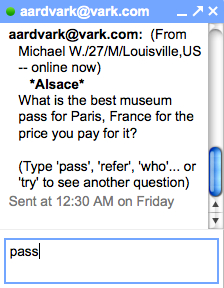
Here's what happens when I send a question to Aardvark. I asked, "Why is the sky blue?"

I was impressed that Aardvark prompted me for more details to my question. I can see how that would help the person who might potentially answer my question.
In this case, I didn't elaborate. Aardvark acknowledges my input and assigns it a subject (it must have drawn from its thesaurus or something).

A few minutes later, I received a response from someone whose profile indicated that he was in Sweden. His reply was, "Because it looks a lot better than yellow". Heh.

And very shortly after that, I received a better reply (this time I chose to look at the reply via the Vark dashboard):

From my dashboard, I can also rate the quality/ appropriateness of the reply. Or flag inappropriate responses. Aardvark also allows me to look at the profile (as much details as they choose to reveal) of those who've answered my question.
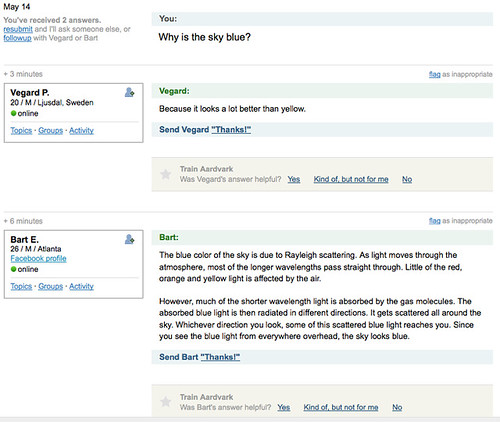
MY QUICK ASSESSMENT OF AARDVARK
Many aspects of Aardvark impresses me.
It's intuitive and simple to use. Usability and system functionality are excellent -- the ease of setup, how quickly I was able to familiarise myself with the dashboard, how I'm able to track the questions I've asked and also the answers I've received, the level of interactivity between the system and myself (and indirectly with other users).
It's clearly very accessible (the service is just an email and chat away).
Aardvark's developers have clearly considered the user experience. I've no doubt I'm interacting with a machine. Vark doesn't pretend to be more than what it's not. Still, I'm feel I'm treated as an individual and that my question is important. There's an approriate amount of feedback and responses are timely.
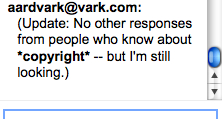
What is less certain is the quality of answers. Case in point: the responses to my "why is the sky blue" question.
The first response was clearly a joke. The second response was much better but what it lacked was the citation (this is my librarian training kicking in -- we're taught to always provide the source, so that users can also verify the information themselves).
IMPLICATIONS FOR LIBRARY REFERENCE SERVICE CONCEPT
It's easy to adopt the system feature of Aardvark, but I'd suggest what is impressive about aardvark isn't its system features but its idea of utilising social network to fulfil an information need.
More important, Aardvark respresents a paradigm shift in where we librarians see ourselves in the user's information search process.
Librarians often treat a question as "completed" when we have sent off the reply. We see ourselves as the final stop in the user's information search. But looking at Aardvark, it is clear that one individual's reply is but one facet of the many responses the information seeker could potentially receive.
Which means, librarians have to see ourselves as merely participants in the users' information search and NOT a "one-stop" or "only-stop".
To put it bluntly, it's time to step down from the professional pedestal.
Aardvark forces us librarians to see that the user ultimately assesses the answer based on its relevance and not primarly WHO provides the answer.
I've heard fellow colleagues tout that the information services provided by librarians are superior because of our training and expertise. I'd humbly suggest those aren't selling points that users can relate to. To put it bluntly, users don't care about your credentials as much as the answers they can get immediately and whether they find the information relevant.
WILL AARDVARK SPELL THE DOOM FOR REFERENCE SERVICES IN LIBRARIES?
My snappy answer is 'No'.
At one level, this is an excellent wake-up call for librarians. An impetus to reassess the way we deliver reference and reader-advisory services. We librarians can see Aardvark as a competitor and we'd better react to it.
When I say "competitor", I mean a friendly one. There's no need to treat Aardvark as an adversary. I'd take it as a benchmark and a model to re-think our service.
Two, I see a service like Aardvark as something that would raise the overall awareness of Information and Reference Services among the library potential customers. For example, a person might not have used the library or any information service before Aardvark. If librarians time it right and leverage on heightened awareness, it serves as a way to promote our service.
Three, librarians should see Aardvark as a space where we become community members and participants. If we establish our credentials, as those who consistently provide answers which other community member rate highly, then I'm confident people might turn to us directly.
Aardvark might be a chance for librarians to reinforce our Brand. E.g. we'd never give a frivilous answer to "why the sky is blue".
Four, librarians (who have the competencies and passion) would automatically have an advantage over most users in terms of professional standards. I don't mean librarians neccessarily "provide better information". What I mean is the way librarians (in general) are trained to provide citations, verify and triangulate sources etc.
CONCLUDING THOUGHTS
In Aaron's post, he wrote: "Like it or not, librarians are not the first people [others] think about whenever [they] need to know something".
I feel we have to accept that as a permanent reality.
To any librarian who does not believe and accept that reality, I'll ask them this: When you have a question on what to eat for lunch or where to visit during your vacation, do you ask a friend or a stranger?
I'll go back to my earlier point, about how I tried out Aardvark only after Aaron spoke to me face to face. I'd left his email invite sitting in my email in-box for days. It was only after he explained how it works and said "You have to try it" that I decided to do so.
I'm not suggesting librarians try to be friends with everyone. We can't.
What I'm saying is that the way to go is for librarians to be part of people's social networks. Granted, critics will say this isn't scalable but I'd argue we're not giving up the in-library service.
It's about extending our reach.
Having one finger out there -- being a friend to one person in the community -- is better than none at all.
[Update 16 May 09: If you wish to try out Aardvark, leave a comment with your email or email me, indicating three topics you see yourself answering. I'll send you an invite. As of this post, Aardvark is 'by invite' only].

Dude, great post. Surely one of your best! I am trying vark because of you.
ReplyDeleteEmail me if you need an invite to Aardvark. Cheers!
ReplyDelete